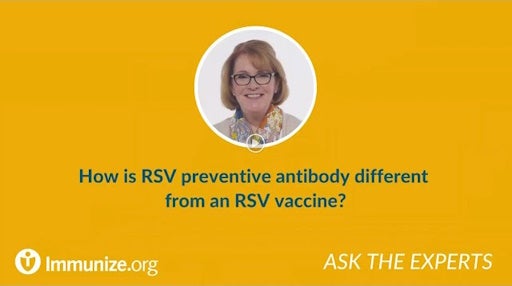- RSV (Respiratory Syncytial Virus)
- RSV Preventive Antibody Product (Nirsevimab)
How is nirsevimab different from a vaccine?
Vaccination involves active immunization, where an antigen is administered to a recipient to activate the recipient’s immune system and generate an immune response (which includes developing antibodies). Active immunization may require up to 2 weeks to have its full protective effect, and sometimes a series of vaccinations is required. Protection may last for months or be life-long, depending upon the type of immune response triggered. The effectiveness of a vaccine depends on the recipient’s immune system.
Nirsevimab (Beyfortus, Sanofi) is an injectable, long-acting monoclonal antibody product that gives the recipient direct, immediate protection through passive immunization. The antibodies of nirsevimab circulate in the bloodstream and recognize and attach to the RSV virus if encountered, leading to elimination of the virus. These antibodies protect the patient for at least 5 months until they gradually break down and disappear. The highest risk of severe RSV infection and hospitalization for children is during their first RSV season as an infant. Nirsevimab will not prevent children from getting RSV infections in future seasons, but the general risk of hospitalization due to RSV in childhood is far lower after infancy.
